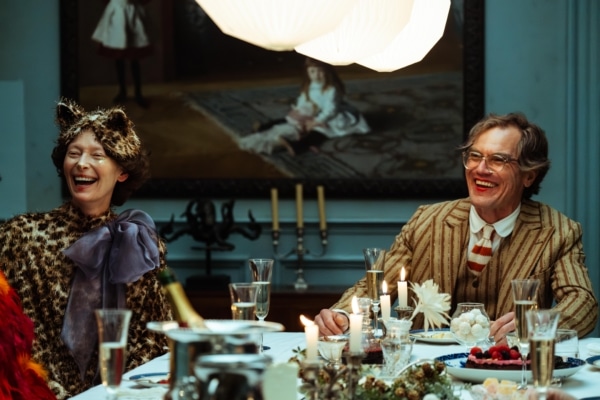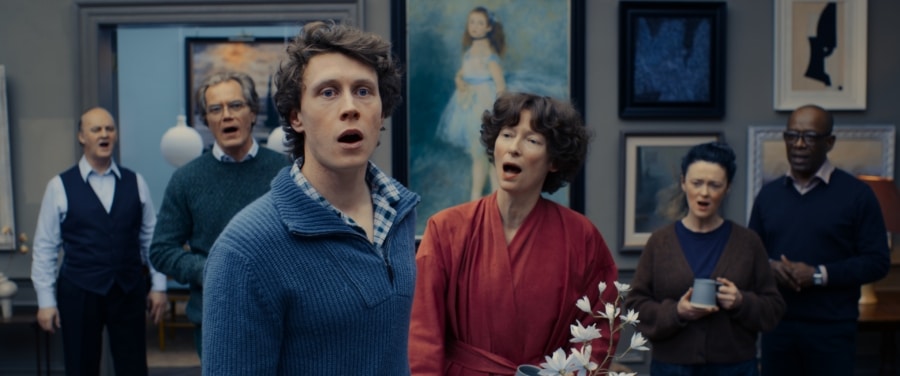I will be upfront and say that I’m not a fan of musicals. I’ve seen many classics like Grease, West Side Story (original and remake), and The Wiz. You’ll never hear me whistling a tune from one, but I can appreciate the art form. That’s why I hesitated to find any connection with Joshua Oppenheimer’s The End when I first heard about it, but the concept was still interesting. What I didn’t expect was to be fully engaged with the story, acting, and singing. All for me to leave the film moved with striking imagery to fully absorb.
The End, directed by Oppenheimer and written alongside Rasmus Heisterberg, is about the world’s end. The film stars Tilda Swinton (Mother), Michael Shannon (Father), George MacKay (Son), and Moses Ingram (Girl). The family is held down in a bunker inside a salt mine where the days bleed from one to the next. However, things change when a stranger, the Girl, finds their way into the mine, and what begins is an emotional rippling effect across everyone.
The first thing to mention about what works for The End is the direction from Oppenheimer. Most, if not all, of the movie takes place in this salt mine where life lacks anything. The family has made parts of the location more of the interior of a well-furnished and comfortable mansion, but it’s still devoid of purpose. Oppenheimer challenged himself to create something so plain and boring to flourish during the musical numbers.

There are times when Oppenheimer uses subtle camera tricks to telegram the characters’ thoughts. For example, Swinton leads a scene showcasing the regret across her mind daily. Oppenheimer uses a wall mirror, perfecting timing, and lighting techniques to explode the echoes in the mother’s thoughts. It grabbed my attention only to hold me tighter in such a captivating way. Yet, he doesn’t stop there.
Shannon has a couple of musical numbers as well—I’m shocked, too—that were truly great to watch. One piece featured the actor going for it, allowing Oppenheimer to use those strengths. The director sets the scene for Shannon to fit solely in the center shot in the vast chasm of the salt mine. Oppenheimer focused all the attention on the character’s plain and dull looks only to denote a moment with a beautiful yet simple depiction of the sun within the mine. Seeing how it connects with the father’s entire testament to his feelings was astonishing.
Obviously, none of this would work without the surprising singing talent of the cast.

The film plays to everyone’s strengths. Shannon isn’t forced to hit high notes, but the music handles the actor’s gravelly voice to enhance the mood. Swinton handles her own as well. She wasn’t my favorite per se because her tone would find the instance where it was akin to a songbird outside my bedroom window and wouldn’t let me sleep in. MacKay is the one who really caught me off guard. The actor has said that he had to be trained for the singing portions of The End, and he excels. Additionally, Ingram is the one who comes out on top for the movie. Her singing brings so much emotion to the scene, and the final number demonstrates just how heartbreaking her situation will be.
The movie works for the most part, but there are a couple of issues.
For most of Act 1 and some of Act 2, the film moves to a crawl. The movie has a couple of musical pieces that try to gain interest within the film, but it doesn’t help. It wasn’t until the middle of the second act that the movie finally clicked with me. It’s almost like Oppenheimer and Heisterberg didn’t know how to get to the message they were starting to state precisely and hoped some of the singing would mask that notion.
This movie’s final dent is that some of it is boring. I felt mildly engaged between pivotal plot points and music numbers. Once again, it wasn’t until the middle of the second act that The End found its footing, and I became fully invested in these characters. Fortunately, the two-hour and twenty-eight-minute runtime gave the movie enough room to get back on track.
The exquisitely beautiful and tragic story of The End falls in line with confronting grief and regret at the end of the world. The acting, singing, and direction are top-notch but don’t entirely save the movie. It’s entertaining nonetheless and has a heartbreaking message by the time the credits roll. I thought I was in for a corny take on the apocalypse. Instead, I got a realistic look at people trying to survive, asking, “Is it worth continuing life when everything else has lost all meaning?”

